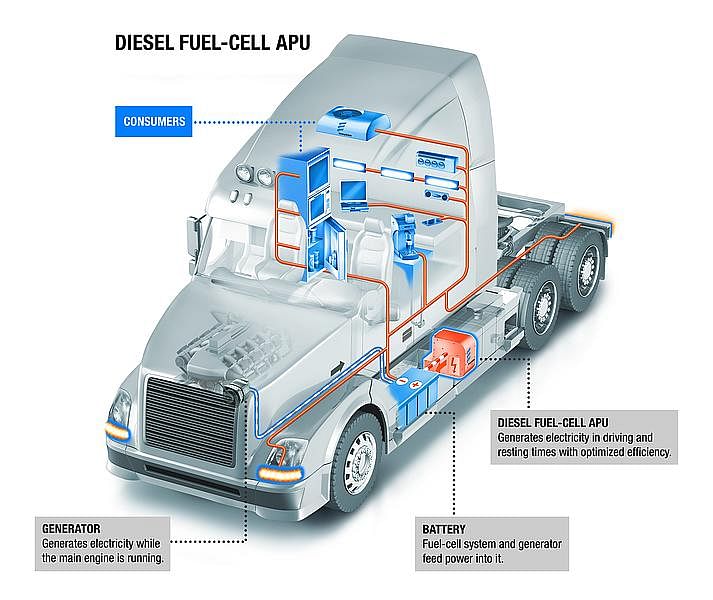Eberspächer succeeds in generating electricity from diesel
With an innovative fuel-cell APU (Auxiliary Power Unit), Eberspächer has succeeded in very efficiently converting diesel into electricity in order to supply all on-board components.
With an innovative fuel-cell APU (Auxiliary Power Unit), Eberspächer has succeeded in very efficiently converting diesel into electricity in order to supply all on-board components. The system – entirely independent from the engine – revolutionizes electrical energy management in trucks.
The numerous consumers of electricity on board a commercial vehicle require constant electrical power. The new fuel-cell system generates this electrical power from the diesel in the vehicle’s tank – with no loss of mechanical power – quietly, efficiently and almost completely pollution-free. An electronic control ensures that only as much electricity is produced as is required. The maximum output is 3kW and the declared efficiency up to 40 percent. This means that the system operates so effectively that it can be used not only while stationary but also as a continuous power source.

The electrification of commercial vehicles is an important aspect of broader fuel economization and CO2 reduction in the transport sector. The fuel-cell APU is an important building block in this future strategy. Many energy-intensive consumers, such as cooling water- and hydraulic pump or compressed air system, which have up to now been coupled with the driving engine, could in future be operated more efficiently by electric means using electricity from the mobile fuel-cell system. Also the air-conditioning compressor today coupled with the engine, as well as an additional auxiliary cooling system, could be replaced by a single electrical AC system – whether in driving mode or stationary.
By changing from mechanical to electrically-driven components, weight distribution within the trucks can also be revolutionized. The development is being advanced in cooperation with a well-known commercial vehicle manufacturer. Extensive practical testing will be carried out in 2014. It’s planned to launch the fuel-cell APU initially on the North-American market at the end of 2017.
The Eberspächer Group is one of the world´s leading system developers and suppliers of exhaust technology, vehicle heaters and bus air conditioning systems. Eberspächer is also a professional innovation partner for the automotive industry in air conditioning of special-purpose vehicles and in automotive electronics
RELATED ARTICLES
Autoliv Plans JV for Advanced Safety Electronics With China’s HSAE
The new joint venture, which is to be located strategically near Shanghai and close to several existing Autoliv sites in...
JLR to Restart Production Over a Month After September Hacking
Manufacturing operations at the Tata Group-owned British luxury car and SUV manufacturer were shut down following a cybe...
BYD UK Sales Jump 880% in September to 11,271 units
Sales record sets the UK apart as the largest international market for BYD outside of China for the first time. The Seal...






 By Autocar Professional Bureau
By Autocar Professional Bureau
 29 Nov 2014
29 Nov 2014
 7113 Views
7113 Views





 Ajit Dalvi
Ajit Dalvi




